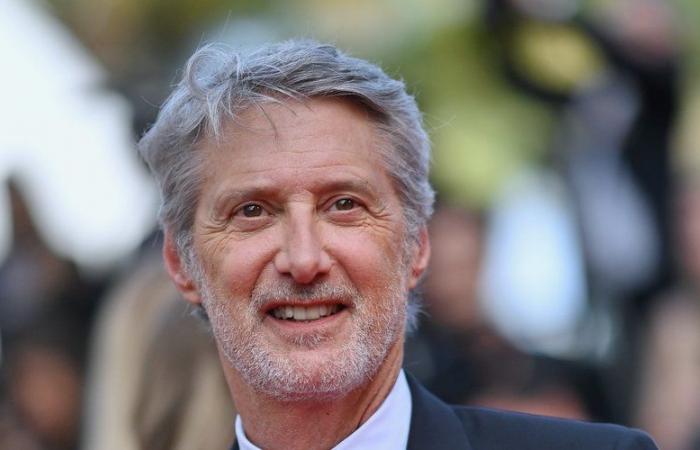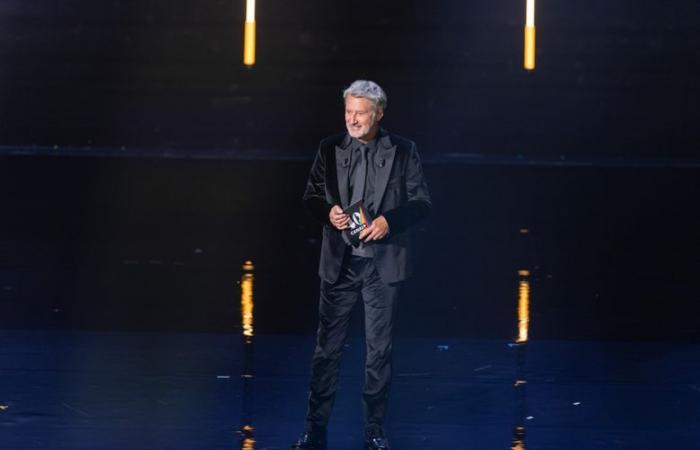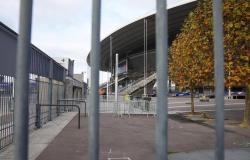Host, actor, filmmaker, Antoine de Caunes is also one of the pioneers of Canal + which celebrates its 40th anniversary on November 4. It takes us behind the scenes of the history of this channel which imposed a new model and instilled, for a long time, a new tone in the French audiovisual landscape.
On November 4, 1984, a new concept arrived on the small screen with Canal + What are the driving forces behind this project?
François Mitterrand grants André Rousselet a concession to create the first pay channel in France. The idea is to offer cinema, sport and a free part, the showcase, to make people want to subscribe.
But at the start it's a little chaotic… It's the first time that a new private channel has seen the light of day in France. We need decoders to have access to it, but for a while there was a whole technical mess.
Added to this is the fact that Mitterrand announced that he was going to liberalize the airwaves and therefore that lots of free channels will arrive. Which makes people even less inclined to subscribe….
The beginnings are complicated, it doesn't happen overnight. The channel owes its first success to the “ball” films in 1986.
What memories do you have of your first steps on this channel, of which you are one of the pioneers?
I first stayed at Canal in 1984 for a few months. In the first schedule of the channel, I have a daily show called “Especially in the afternoon”, every day live with my friend Gilles Verlant (died in 2013, Editor's note), we talk about cinema, music, literature, fashion, everything that makes up pop culture, my hobby horse at that time.
But the beginnings are so complicated that the management, Lescure and De Greef have to review their copy and redo a new grid, simpler, less expensive. I then left to do some “Enfants du rock” and a collection of radio shows in the United States, “Marlboro Musique”. Then I returned to Canal in 1987.
You then take over from Les Nuls which has just brought a new tone to the small screen.
Les Nuls did the first season of “Nulle Part Else” and after a year, they got tired of doing daily work because it was quite time-consuming.
De Greef then tries to reconstitute another quartet of comedians with Karl Zéro, Peter Stuart, Gilles Verlant and my apple, it's called PAKG, our mission is to make false advertisements and parodies in the spirit of Dummies. Then, quite quickly, De Greef asks me to come up with an idea to introduce the guest from “Nowhere Else”, it will be an introductory monologue.
Digital photo – Vincent Capman
We also try lots of things to end the show, returning to the guest, with panegyrics, fake obituaries, but it doesn't work very well. And then one day I dress up, it makes us all laugh and it starts like this…
This first duo then emerges which marks the spirits, the one that you form with Philippe Gildas.
The roles are distributed, Philippe is “Mr. Loyal”, I am his white clown. It's up to him to play the serious card, the interviews, I take care of making people laugh. We quickly realize that we complement each other perfectly. We get along beautifully, we make each other laugh, the chemistry works…
These Canal years were marked by the death of Bruno Carrette in 1989. André Rousselet rented a plane so that the teams could attend his funeral. This says something about the spirit that then reigns in this chain.
Absolutely, there was already this family, tribal spirit, we were a whole group, we were all very close to each other and that's what also gave the particular charm of the antenna at that time, people of the same generation had fun working with a tool that allowed many things. A real laboratory (from which many artists will emerge, from Jamel Debbouze to the Deschiens via the Robins des bois, Omar and Fred, Editor's note).
It was a place where we could try to make TV differently, in a very different state of mind.
Because Canal was created by people who came from television, it wasn't that common in this environment, it was always technocrats who took charge but didn't know how to make TV.
And we grew up with the same music, the same films, English and American television, Saturday Night Live. That's what made the difference. It’s a certain approach to television, to entertainment, pushing the boundaries.
This is also due to the relationship you have with your bosses, Lescure and De Greef…
Yes, there was not at all this relationship that we had known in the work before where we were dealing with adults, serious, responsible people who tolerated me doing rock music while they had nothing to do with it. to fuck.
There, suddenly, I was dealing with people who understood what I wanted to say and whose language I understood. We saved a lot of time…
Canal is also known for its festivals and this is not just a legend. Dominique Farrugia told me that this was even part of the clauses of the contract for “Les Nuls l’Emission”…
It was in the culture of the channel and of the time (smile). There was a very festive side. I remember the “Dummies, the show” parties very well. There was the live performance and then after an evening where we laughed, we danced, it was extremely joyful.
One of the markers of the channel is also this new duo that you then formed with José Garcia, spotted when he was responsible for warming up the audience. How do you work together?
The texts of our characters, the matrix, are written by Laurent Chalumeau, but I add my two cents. José discovers the characters he will play the same evening, generally 3 hours before the broadcast.
This is what makes the exercise so special. It gives a freshness, a quite remarkable innocence, with the risks of being live. That is to say all the possible and imaginable traps that I set for him to amuse myself (laughs)
This complicity can still be found today…
Yes, with José, it’s life and death. And we always have fun carving out niches whenever we can…
To the point of offering Philippe Gildas one last gag on the day of his funeral…
José Garcia showed up dressed all in white like a handsome nurse, with “mom”. I told him that it was the dress code… He was very angry with me.
His magazine “Vieux”: “For the first time in my life, I know what I’m talking about”
He calls her “my little old man”. We knew the journalist, the host, the actor, the director, the author… Here is the editorial boss. Since last May, Antoine de Caunes has been at the helm of the new quarterly “Vieux”, aimed at all those who are elderly and those who will become so. The target audience is therefore quite broad… “And it works very well, confides Antoine de Caunes. We launched this a bit in the spirit of a fanzine, with a light economy and without knowing very well how it was going to be received with this somewhat “provocative” title. He was a hit with number 1. We are delighted. We didn't expect that at all.”
His analysis? “It seems to occupy a space that was vacant until then, he explains. We talk about age, about transmission, and without false modesty, without coquetry either. And then calling things by their name. An old man is an old man, he's not a senior, he's not mature, he's not a vermilion card, he's an old man. I am an old man myself because I have passed the 70-year mark. So, for the first time in my life, I know what I’m talking about!”
Many Canal + figures subsequently left the channel during the Bolloré era, the target of numerous criticisms. You chose to stay. For what ?
Because this channel is part of my DNA, as I am part of its and I have work habits and a freedom on Canal that I find difficult to imagine elsewhere. Personally, I have never had to suffer from Bolloré management.
I continued to make shows, including very experimental programs, like “Antoine’s Gaul,” for three years. I couldn't have done it anywhere else. So, I'm at Canal and I don't plan to move there.
But what remains today of the original Canal spirit?
Lots of things. There remains in original creation the taste for risk, when they make series like “D’argent et de sang”, or “La Fever”. There are some pretty radical series that I can't imagine seeing elsewhere.
There are all the short programs, with new generations of comedians, Bertrand Usclat, Kyan Khojandi… There is what Mouloud Achour does, which gives voice to people who cannot be heard elsewhere. There is always Grosland. I find myself there.
It has transformed, obviously, we are much closer, today, to a platform than to a television channel, as at the time. But, for me, the creative fundamentals are still there.
You don't miss the Guignols of the news?
Yes, I regret that there are no longer the Deschiens too. It's not me who makes these economic and industrial decisions. The best things stop and come to an end. When I reach the end of a series and it isn't renewed, I don't mind. It's part of the rules of the game.
Do you really maintain total freedom of tone and action as far as you are concerned?
Yes, I make the television I want to make. I have complete freedom of movement.
With the announced disappearance of C8 from TNT, by decision of Arcom, Cyril Hanouna announced that he would remain in the Canal + group. What will its place be?
No idea, I don't know if it will arrive on the Canal channel or not, it hasn't been announced, at least at this stage. I am on this flagship of Canal +, there are other companies in the group with which there is no connection or particular relationship.
What will the special evening organized this November 4 to mark Canal’s 40th anniversary look like?
We called on a lot of talent from the chain, from Mathieu Kassovitz to Stéphane De Groodt, including Doria Tillier, Florence Foresti, M. Poulpe and many others to make lots of small magnetos. It's a kind of replay channel.
It's not at all a “Children of TV” show where we open cupboards and go through old archives. The idea is not at all to do a nostalgic thing “look at how beautiful we were and how beautiful we will be”. It's a modern, joyful show, with working talents coming up with funny ideas.







